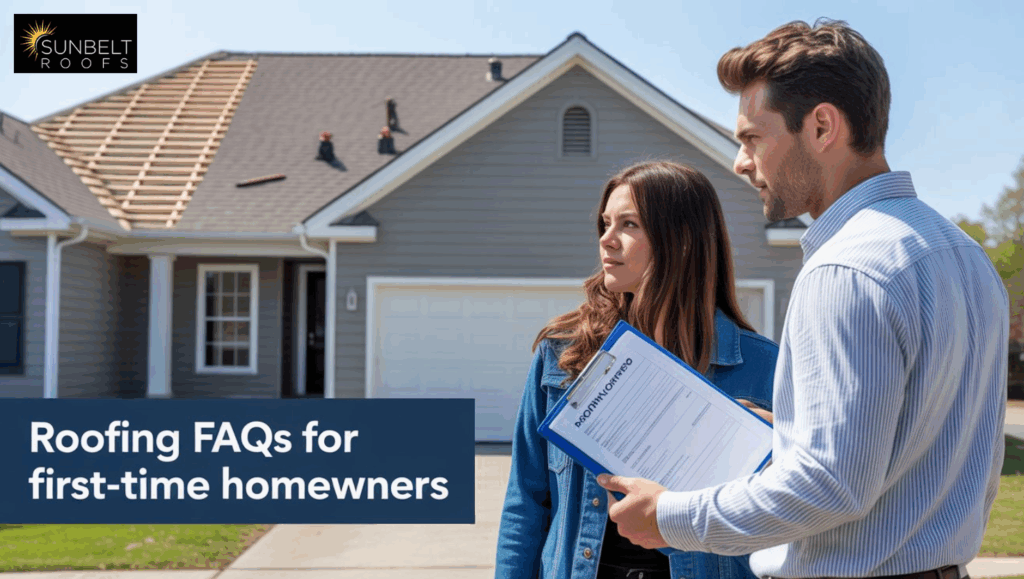
Now that you’ve bought your first house, you have new responsibilities, like maintaining your roof. Contracts, terms, and legal jargon often overwhelm homeowners, making access to FAQ roofing essential. FAQ’s have the answers to the toughest and most commonly asked questions by homeowners, and that gives them the ability to understand everything one step at a time.
This guide will help you understand roof contracts, installations, and maintenance, alleviating any concerns about having an unprotected investment; your answers are found in the questions compiled below.
General Roofing Questions
What does “FAQ roofing” mean for first-time homeowners?
The phrase “FAQ roofing” talks about the happenings and contracts revolving around roofs, and that includes installations, contracts, and materials. Homepage FAQs serve a distinct purpose because they help create a base so that the homeowner knows what will come before they make a contract or an unforeseen repair.
How long can a roof go without shingles?
The most concerning question is how long a roof can go without shingles? The answer is not long at all. Roof shingles are your roof’s first line of defense.
Without them, your roof decking is exposed to the rain, wind, and icy weather, along with UV rays, which can cause extreme damage in a matter of days.
Fixing the problem immediately is necessary when shingles blow off during a storm. Letting the roof remain bare for even a brief period can lead to water leaks, mold, and even structural damage. New homeowners need to understand that missing shingles can be an issue of more than just appearances. Ignoring them can lead to severe damage that is expensive to repair.
What is a roofing starter strip installation, and why is it important?
Another topic that frequently appears in the FAQ is roofing starter strip installation. Starter strips are the first shingles placed along the roof’s bottom before the others.
Why is this step necessary? Because starter strips:
- Offer a sturdy hold for the first row of shingles so they don’t blow off in the wind.
- Provide added wind resistance.
- Help control the direction water flows away from the roof edges.
Without them, your roof can easily suffer damage that is difficult and expensive to repair.
Roofing Contracts and Warranties
How long is a roofing contract acceptable for?
FAQ Roofing: How long is a roofing contract good for? This FAQ answers how long a roof contract is valid for. Most roofing contracts are valid until the roof has been finished.
However, both the timeframe and terms can vary depending on the contractor and the scope of the work.
Contracts generally capture the following:
- Dedicated project start and end dates.
- Dedicated payment schedules.
- Assigned materials and the methods of their installation.
As much as we would like, we cannot ignore the fine print. A contract benchmarked on industry standards is a reasonable contract with set expectations for both the homeowner and roofing company.
What should first-time homeowners look for in a roofing contract?
As much as we would like, we cannot ignore the fine print. A contract benchmarked on industry standards is a reasonable contract with set expectations for both the homeowner and the roofing company. What should inexperienced owners consider when signing a roofing contract?
As a minimum, the following should be included:
- Include a detailed description of the work that falls within the scope of the contract.
- Type and quality of materials that will be used.
- Timelines for finishing the project.
- Conditions to make payment.
Understanding these details thoroughly can alleviate a homeowner’s anxiety and prevent future disputes.
Common Concerns for First-Time Homeowners
How do I know when it’s time to replace my roof?
Being able to spot the signs that show a roof is failing is valuable. Some indicators are:
- Curling or missing roof shingles are among the signs of roof failure.
- Water stains on the ceiling and wall.
- The increased energy consumption leads to a higher utility bill.
Scheduled roof inspections include a roof that is in optimum condition and the ability to spot any small issues that would become destructive later on.
What type of roofing is best for beginners on a budget?
Cost is a common feature that most first-time owners consider when it comes to roofs.
The simplicity in affordability, durability, and ease of installation is why asphalt shingles are one of the most popular roofing options. If you’re willing to pay more for your roof, metal roofing is another good investment for longevity. To compare different solutions, check out our Top Roofing Services for Homes and Businesses to see what best fits your budget and needs.
Can I handle small roofing issues on my own?
It is effortless to want to fix things yourself, but roofing is one of the more dangerous aspects of construction. Smaller tasks, such as cleaning out the gutters, are perfectly fine, and one can do them without worrying. Other tasks, such as repairing missing shingles or the roofing starter strip, are tasks that can be dangerous and should be left to the professionals. Attempting to perform these tasks yourself could potentially void a warranty or exacerbate the existing problems.
Final Tips and Takeaways
First-time homeowners may experience confusion and overwhelm when choosing a roof. Using the roofing FAQ, Roofing Point will guide them and make the process much easier. Keep in mind these tips:
- Missing shingles are a more pressing issue than most people think, which is why it is better to fix them immediately rather than waiting.
- Make sure to go through your roofing contract and know how long a roofing contract is good for…
- Understand the critical steps of roofing starter strip installation, as this will make sure your roof is built to last.
- If you live in storm-prone areas, explore options like a Fortified Roofing Service to add extra protection and long-term value to your home.
Conclusion
The process of roofing should not be as complicated as it is made out to be.
By utilizing expert services like Sunbelt Roofs, alongside obtaining the requisite knowledge pertaining to your roofing queries, you will be fully equipped to protect your residential property. If you are also trying to figure out how long a roof can go without shingles on, need information on roofing starter strip installation, and want to understand how long a roofing contract is good for, these are just some of the FAQ about roofing.The peace of mind, together with the investment one hopes to protect, can be guaranteed if one is a first-time homeowner who is well-informed about roofing and its fundamentals. For trusted advice and expert solutions, feel free to Contact Us today.
